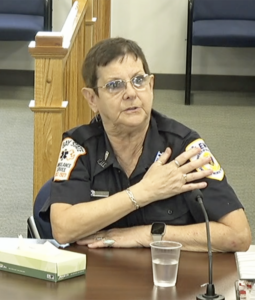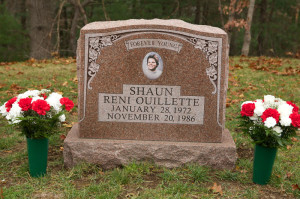Murder victim’s family terrified as parole decision looms
By Jay TurnerIt’s been 18 weeks and counting since Jeanne Quinn last faced her son’s killer in a Natick hearing room, and the uncertainty surrounding his future whereabouts is almost more than she can bear.
Not even the news of her cancer returning, or the impending surgery she’s facing, have been enough to erase the doubts about the direction that the state’s parole board might be leaning, or worse, how she might possibly cope should her darkest fear be realized and Rod Matthews — the man responsible for the senseless “thrill killing” of her firstborn, Shaun Ouillette — is granted his release.

Jeanne Quinn explains the significance of the uniform she wore during Rod Matthews’ parole hearing in June.
“At least if he stays in prison, we can keep an eye on him,” said Quinn, who has been haunted by recurring nightmares since the June 5 hearing — Matthews’ fifth attempt to secure his freedom since he first became eligible more than 20 years ago. “If he gets out, he can go anywhere. But I have one child left, my daughter Yvonne, and she’s in an electric wheelchair and has no way to defend herself. And it’s not just about me and my family; it’s also about the safety of this town and the people of this town.”
While Quinn was assured she would be notified of a decision within 180 days — today marks day No. 127 — parole board members acknowledged during the hearing that Matthews’ case is not only unique but incredibly complex.
One of the state’s most notorious teen killers and also one of the first juveniles to be tried as an adult, Matthews was only a high school freshman when he lured Ouillette, his chosen target, into a wooded area in Canton in the fall of 1986 and ambushed him with repeated blows to the back of the head with a baseball bat. He later bragged about the act to two of his friends and took both in the ensuing days to view Ouillette’s body, which authorities discovered three weeks later, frozen and ravaged by animals.
During the ensuing trial, friends of Matthews testified that he did it because he wanted to know what it was like to kill someone, and in March of 1988 he was convicted of second-degree murder and sentenced to life in prison with the possibility of parole after 15 years.
In light of recent case law, notably the ruling of the state’s highest court in Diatchenko v. District Attorney for the Suffolk District (2013), combined with a deepening understanding within the scientific community of adolescent neurological and psychosocial development, the parole board must now consider not only the “unique characteristics” of juvenile offenders, including a “lack of maturity and an underdeveloped sense of responsibility,” but also their character and actions since conviction and whether they have grown out of characteristics that might have had a causal link to their prior criminal behavior.
During his most recent parole hearing, Matthews himself even referenced Diatchenko, while urging the board to consider that the “younger you are, the better chance that if you go through rehabilitation, you will change.”
“That is true,” acknowledged board member Dr. Charlene Bonner, “and that is borne out in the research, which is hard for people to accept — that you can commit the most despicable, heinous, unnatural act as a juvenile and the research says that’s not a barrier to rehabilitation for juvenile offenses.”
In Matthews’ particular case, Bonner said both his clinical evaluations and his actions during more than 37 years of incarceration indicate that he’s done “everything he possibly can to unpack what he did, understand it, and better himself.” At the same time, Bonner noted several aspects of Matthews’ crime and his conduct in the months leading up to the murder that made him “unique” even among juvenile killers, such as his frequent fire setting and the fact that he planned and carried out a brutal violent act without the encouragement of peers — something that is often a hallmark of such crimes committed at that age.
Because of these factors, Bonner said she would be considering his age at the time of the offense but also the fact that he exhibited the signs of a “very, very disturbed person.” She also said she would be giving weight to “what [Matthews] did and the victims’ testimony and the repercussions on their lives and the community.”
Board member Rafael Ortiz also raised concerns about the brutality of the crime, and asked if he had thought of Ouillette’s remains as a kind of “trophy” when he revisited the site with friends, which Matthews denied. He also noted that while Matthews had done work in prison to better himself and had found a rewarding opportunity as a volunteer medical companion, the victim’s family “probably doesn’t have anything rewarding about what happened.”
The other concern raised by several board members — and one that factored significantly into the board’s denial after his fourth parole hearing in 2021 — was whether Matthews had demonstrated the capacity to feel empathy, not just for the victim and his family but for others he had harmed with his actions, including his classmates and the broader Canton community.
Matthews insisted that he was not only capable of such feelings but had greatly strengthened his capacity for empathy through therapy, group work, and years of intensive self-reflection. “Now I go through my days respecting people around me, caring about people, understanding people, having compassion for people,” he said, while pledging to “never harm anyone ever again.”
As for why he committed the act of murder and why he chose Ouillette, Matthews said he has learned through therapy that his rage was the result of severe emotional disturbances exacerbated by a severely dysfunctional family dynamic. He stressed that Ouillette did nothing to deserve the pain and suffering he inflicted on him, and noted that the guilt, shame and remorse he now feels is a central part of the person he has become.
“I wish I could go back and undo all of the darkness I caused back then and all that still persists,” he told the parole board. “I especially want to go back to allow Shaun to have lived past the young age of 14 and grow up to experience life like he should have with his family and friends … again, I am truly sorry for taking Shaun’s life.”
Despite Matthews’ repeated insistence that he is “not that kid anymore” — a familiar refrain used at his prior parole hearings — board member Tonomey Coleman, who led the questioning, said he still had some of the same reservations he had three years earlier. “According to our own risk assessment tool, you’re low risk, and you’ve done all the work; there’s no questioning that,” he said. “But whenever we speak to you there seems to be some sort of a disconnect, so that’s what I’m struggling with.”
Among those speaking on behalf of the victim were his sister Yvonne, his brother Matthew, and a representative from the Norfolk County District Attorney’s Office, who implored the board to deny Matthews’ bid for parole in the interests of public safety. Quinn, who also spoke at the hearing, noted that she was heartbroken that no members of the media attended or reported on the June proceedings, in large part, she suspects, because they were preoccupied with the Karen Read murder trial.
“The victim witness advocate came and found me to tell me that they had a room set up for all the media members, and when I went in there, the room was empty,” she recalled. “Nobody came — no newspapers, no TV media. It felt like everybody had just moved on.”
The one person from Canton who did show up to speak on Ouillette’s behalf was Police Chief Helena Rafferty, and Quinn felt she did a “phenomenal” job in articulating the damage Matthews had caused and the fear that still remains in the community.
Rafferty recalled that she was a 19-year-old college student at the time of Ouillette’s death. “Our idyllic little town and the comfort, safety and security that it offered everyone was disintegrated by the calculating, menacing manipulative killer who happened to be a depraved, 14-year-old boy,” she said.
In the weeks leading up to the hearing, Rafferty said she had been approached by several residents who urged her to attend. “Some of these people are elderly and are terrified that Mr. Matthews may get released and severely harm them or another,” she said.
Rafferty said Matthews had “vaguely touched upon” what he could do to make up for his crimes as a rehabilitated person, but the answer, in her opinion, was “painfully obvious.”
“Truly own it and put Shaun’s family first,” she said. “Yet your bids for parole have dragged this grieving family back five times. Mr. Matthews has not put anyone first, most especially Shaun’s family since November 20, 1986, when he had Shaun walk in front of him to his death.”
Quinn, at the urging of a firefighter she knows, chose to wear her old EMT uniform to the hearing — the same one she was wearing when her son was killed — and she pointed out to the board members the symbolism of the Massachusetts seal that was displayed on her sleeve.
“It’s the same one that’s on your flag and it stands for the commonwealth of Massachusetts,” she said. “It’s a phrase you don’t hear anymore; they refer to it as the state of Massachusetts … but it’s the commonwealth and there are only [four] of us in this nation. And it’s important, it means something, because it means for the wealth, the health, and the wellbeing of the common people, and we’re losing that.”
Quinn mentioned a distant relative of hers who was killed by a Massachusetts parolee, as well as other such cases, including one involving a veteran Woburn police officer, Jack Maguire, who was shot during a robbery at a Kohl’s department store.
“I could talk to you about what Shaun meant to me,” added Quinn. “He meant the world. He almost died in my arms when he was born. He meant everything to me. But I think this is more important because I’ve said all that before.”
“And I’m still afraid,” she said. “I may have done this job [as a firefighter/EMT] and know the ins and outs and everything else, but I’m still the mother of one more child, and I’m frightened, right down to my socks I’m frightened.”
Short URL: https://www.thecantoncitizen.com/?p=127324











